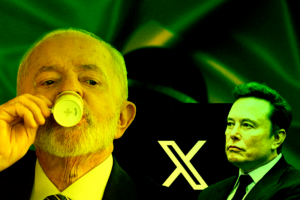Right-Wing Nationalism Threatens Our Future
Neoliberalism has hollowed out our politics. Now, authoritarians are filling the void across the globe, says journalist John Feffer. Brazilian President Jair Bolsonaro. (Palácio de Panalto / Flickr)
Brazilian President Jair Bolsonaro. (Palácio de Panalto / Flickr)
What follows is a conversation between journalist John Feffer and Marc Steiner of The Real News Network. Read a transcript of their conversation below or watch the video at the bottom of the post.
MARC STEINER Welcome to the Real News. I’m Marc Steiner, great to have you all with us. And we’ve watched the rise of the right wing all over the globe, racists, xenophobes, nationalists, democratically seasoned control of governments and are becoming rising powers all over the place in places like Brazil, India, Italy, Poland, to name just a few. They’ve found a way into the hearts and minds of working and middle class people across the world terrified of the future. Now, the largest economy in the world, our own, the United States has fallen as well to the rise of the right with right wing nationalist movement seizing, as I like to say, the executive branch. So we have Donald Trump who can now play godfather to the rest.
How did it happen? Once the left had led the way around internationalism and the fight against exploitation, but now, the rhetorical rise comes from the ideologues who worry about Europeans, white folks, non-Muslims being replaced by the other, capitalist economics and neoliberal politics gave rise to the contradictions that allow the rise of the right. What does that really mean? So what is happening and what should be the response?
We talk now with John Feffer, who’s director of Foreign Policy in Focus at the Institute for Policy Studies in Washington, D.C. And he’s written about the rise of the right in TomDispatch, The Law and The Nation and many other places, and also, he’s the author of a dystopian novel, Splinterlands that warns us of what we might face in a much more creative way. And welcome, John. Good to have you with us.
JOHN FEFFER Thank you for having me on the show.
MARC STEINER So where do we even begin? I mean we watched this phenomena happen across the globe, the pinnacle being Donald Trump’s election here. Take a step backwards a bit and talk a bit about what you wrote about in one of your pieces … They’re coming together in my head, I can’t remember which piece, but it was a lot of the other pieces you wrote, where you talk about the end of the Cold War and talk about what the end of communism and the failure of labor unions falling and the rest kind of leading to this world we’re in now. So talk a bit about your perspective historically on why we are where we are.
JOHN FEFFER Sure. Well, first of all, I’d say that during the Cold War period, there was kind of a liberal conservative consensus about a lot of things, about roughly speaking the nature of the economy, roughly speaking the nature of democratic politics. I’m talking about liberals and conservatives in the United States, in Europe, Western Europe, and in some other places around the world. But with the end of the Cold War, that consensus breaks down and it breaks down across the board.
From the point of view of this question of the rise of the right, I would begin by pointing out that there was an anti-fascist consensus basically by liberals and conservatives, a belief frankly that was quite good that fascism should not be part of political discourse, should not be part of the electoral political scene, should not be part of normal discourse in the academy, etcetera. But that breaks down after the collapse of the Soviet Union and you begin to see the rise of fascist politicians, primarily in Western Europe getting a toehold for the first time really in France with Jean-Marie Le Pen, who’s the father of current leader of the far right, Marine Le Pen, the rise of Jorg Haider in Austria, also in Russia, the rise of Zhirinovsky, Vladimir Zhirinovsky, again in Russia where the anti-fascist consensus it seemed included everybody and yet even in Russia, you saw someone like Zhirinovsky emerge basically with fascist tendencies. Now that still remained, more or less, I would say on the margins of political debate.
What thrust that into the mainstream and front and center are basically two phenomenon. The first is the failures of economic globalization. I mean essentially, you have the economic globalization succeeding in increasing trade around the world, bringing China into the world economy, eventually, bringing the former Soviet bloc nations into a world economy. That’s all for the good, but you begin to see the breakdown of economic globalization in two ways. One, greater polarization in wealth, the haves and the have-nots around the world. But you also see basically, the failure of the global economy to prosper. You have, of course, the cycles of capitalism reaching in the late 2000s a massive financial crisis comparable to the Great Depression, if not larger, that throws everything onto the table suddenly. Everything is now open for discussion. And all of the people who have been kind of grumbling about economic globalization because they haven’t done very well as a result of economic globalization are joined by huge numbers of middle-class people as well who are dispossessed as a result of the financial crisis.
MARC STEINER So one thing I think as you were talking about this is that the other factors that you’ve written about as well that kind of fall into this scenario about what happened in the past, I mean maybe we’ll talk about how there was this kind of consensus between liberal conservatives and the Cold War. I always like to think of it also as there was a period of time in history between the ’40s and the ’70s, ’80s when it was mostly white men talking to each other in the halls of power. So they might disagree over liberal conservative economics and politics, but then let’s go and have a glass of whiskey and a cigar, and we all be good friends, right?
JOHN FEFFER Yeah.
MARC STEINER And you had this common enemy. Then the Soviet Union falls. People who didn’t like that rule go to the right. And then, you also have this surge of the post-colonial world and our repressive tactics from this country on to other places. You have forced migrations and more. And so this all gets … And so there’s this racism that’s there to begin with that came out of colonialism and it’s still in Europe and still in the United States very deeply. So these factors all kind of dovetailed to create what we’re seeing now, and I think as you were saying, it seems to me also, the contradictions of capitalism itself that can make a global economy, but can’t take care of the people in the process.
JOHN FEFFER Well, what you’re describing is a backlash against liberalism.
MARC STEINER Yeah.
JOHN FEFFER I mean a backlash against, of course, the economic aspects of liberalism, but also, the kind of cultural aspects of liberalism, a backlash against some of the gains that are made within liberal democracies by minorities, by women. There’s a feeling somehow, primarily by white men, that they are being dispossessed. And when we talk about the dispossession of people by economic globalization and by the financial crisis, but there’s also a perception by white men that they’re being dispossessed by the forces of history if you will. And if you add onto that an enormous uptick in immigration as a result, not only, not exclusively, but largely by wars in Afghanistan, in Iraq, in Syria, in Libya, a huge outpouring of people from these parts of the world into Europe, and this becomes a major issue that the far right seizes on. In other words, it’s not just the dispossession of white men, it’s the dispossession of everyone who’s considered to be indigenous, indigenous to France, indigenous to UK. They are under threat from these outsiders.
And comparable phenomenon in the United States, of course, the far right seizes on immigration coming from Central America and Mexico, also a perception that white Americans are going to be dispossessed by these people. So as you say, these trends are coming together in the 1990s and in the 2000s to create the conditions, if you will, for the rise of the far right.
MARC STEINER So you’ve got this quote in your piece that I really like to share with our listeners because I think that it’s an important one. It’s by Matthew Feldman from the Center for Analysis of the Radical Right. And you quote him as saying, “The demographic replacement is a similar master frame that can unite both clear extremists and conservatives who might be worried about demographic change. Once you add these two together, you have potential majorities in many countries. They found a winning formula. There’s nothing I’ve seen that comes remotely close to countering that formula.” Now that to me, and this one particular article that you wrote was the most frightening line in the entire article. I mean because that’s real. This movement has gained power and I don’t see people having an effective response to it.
JOHN FEFFER Yeah. No, you’re absolutely right. And Feldman points out that this is not something new, this kind of consensus, if you will, between the far right and mainstream conservatives. We saw the same thing in the 1920s and the 1930s both in Europe and the United States. In the United States, you saw this kind of far right racism from people like Calvin Coolidge as well as Father Coughlin coming together to create what would’ve been if it hadn’t been for FDR and a variety of other factors probably a very successful far right in this country. The far right, of course, does emerge in Germany, in Italy, in Spain, in Japan, and based on the similar kind of consensus.
What Feldman is talking about is what’s known as the Great Replacement Theory and the Great Replacement Theory comes out of France in 2010, the notion that these immigrants coming from North Africa, coming from Syria, Afghanistan, they aren’t just coming into France. They have the intention of replacing the French and replacing French culture with their foreign customs, their foreign languages, their foreign religions, and that it’s necessary for the authentic French, if you will, to band together and push them out. Not only stop immigration, but actually remigration, in other words, push current migrant populations out of the country.
MARC STEINER And in some places, they’re doing that. You look, Israel at this moment is doing that with African refugees from, especially Sudan who come into Somalia, who have come into Israel and sending them back out again.
JOHN FEFFER That’s right.
MARC STEINER I mean this is nothing new. And you’re pointing also in your article that this was Hitler’s first idea before he decided to kill all the Jews was to send them off to Madagascar.
JOHN FEFFER That’s right. That’s right. Yeah.
MARC STEINER So let’s talk a bit about where this might be going and what the response is. I mean I think that it’s very real. You see this rise. I remember I guess it was 20 years ago, whatever, there was election in France and my wife and I just landed in Paris with this cab driver, and he was talking to us about how everywhere the communists won, the right wing is now winning-
JOHN FEFFER That’s right.
MARC STEINER … in France. And that’s similar to other countries as well. It’s not just in France. So the question is with this rise of the right that’s extremely powerful, you have Donald Trump in power in this country, so let’s talk about where you think this could take the world and what do you think the response should be?
JOHN FEFFER Sure.
MARC STEINER That’s the most important thing to me.
JOHN FEFFER Well, before I tell you what I think, let me tell you what I think is the mistaken analysis of this.
MARC STEINER Okay. Go ahead. Yeah.
JOHN FEFFER And the mistaken analysis is that this is just the ordinary ebb and flow of politics. So the far right wins this election cycle and the left will win the next one, and maybe the center will come back. I think that’s a fundamental misreading of the current situation because the far right that’s winning, the people that you mentioned at the top of the show, people like Trump, Modi, Orban, Erdogan in Turkey, they’re interested not in serving for a term or maybe two terms. They want to serve forever. They want to be leader for life. You might remember when Donald Trump said that he kind of liked Xi Jinping’s new title, leader for life. Maybe we should look into that in the United States. He wasn’t really joking. I mean-
MARC STEINER I know he wasn’t joking, right?
JOHN FEFFER Like many other leaders, they want to be there forever. In order to do that, they have to dismantle what are known as kind of the guard rails of democracy. They have to suppress free press. They have to go after civil society, freedom of speech, all in order to rig the system so that either they or their daughter, Ivanka, can be leader for life. So that’s my fear. That’s the kind of worst case scenario.
What to do about it? Well, the first thing, of course, is to challenge them across the board and across the board not only within countries, but across countries.
MARC STEINER Let me just stop for a second ‘ cause hat’s one thing you posit in this as you describe this thing is really important because most of people look in the press and people look at the activists, look at what’s happening with the rise of the right as nothing, but pure nationalists, right? You’re making a very simple argument. Your argument is they may be natioinalists in the extent of talking about what’s happening internally in their countries, but this is an internationalist movement. The left used to be the internationalist movement. Now the right is an internationalist movement, and that’s at the heart of this, which just makes it even more dangerous at the moment.
JOHN FEFFER And on the face of it, it doesn’t make sense. I mean if you want to make America great, how can you make America great and Hungary great and Russia great and Turkey great all at the same time? You would think that they will kind of bump up against each other. But in fact, they have common interests and the common interests are in basically dismantling liberal institutions as well as suppressing the left. But for the most part, the left is relatively weak whereas liberal institutions remain even in the United States or throughout Western Europe or even in Brazil, liberal institutions remain kind of the status quo. I mean people believe in democracy. They believe in free elections. They believe in free media and freedom of speech.
So the first thing they want to do in kind of by joining hands across borders is to create a kind of illiberal international in which they push the needle significantly away from the status quo and essentially establish a kind of new status quo in which there is no freedom of speech, in which there are no free free organs of the media. They have other common interests related to immigration, their opposition to social movements like LGBT, women’s movement.
So for us who are opposed to this kind of nationalist international, this illiberal international, I think it’s necessary not only to organize at a national level against Trump, try to get him out of office next term, Bolsonaro, get him out of office next term, but as much as possible, to sever these connections that they are making across borders and to create a new kind of transnational internationalism in support of the things that we hold in common interest, whether it’s primarily climate change, dealing with climate change, dealing with economic inequality, dealing with militarism. These are the issues that a transnational internationalist movement has to put out there in a positive way. And not just say, “We don’t like Trump. We don’t like Bolsonaro. We don’t like Orban.” That isn’t sufficient. I mean the average voter may or may not agree with that, but what they’re really looking for is something new, something positive, and that’s what we have to provide.
MARC STEINER I mean it’s kind of a mixed bag. We don’t have time to get into it now, but a lot of the European right leaders are not homophobic. Some of the leaders are gay and lesbian women.
JOHN FEFFER That’s right.
MARC STEINER So it’s a really different mix than we have here in that regard, but I think that when you … There was a time when, and this is not law in the Soviet Union because they were part of the problem, which is why they collapsed and the left fell apart as well, but they were at one point the only bulwark against the spread of capitalism across the globe. Now it’s everywhere and people are genuinely terrified too about the future. And I think you mentioned that in one of your pieces that people are really terrified about where it’s going. Not so much on I have no money now, but my future is at stake and I think that the problem with the left is they’re not organizing. They’re not part of labor. They’re not part of doing things that actually can galvanize a movement. Say there’s a different way into kind of bask in our heterogeneity, let’s say, in this country as opposed to playing into the other side.
JOHN FEFFER Well, I would agree with you. Though I would say the left has plenty of ideas and has done some organizing. For the most part, the left lacks kind of institutional power. And the reason I think it’s important that you point to the labor unions is because that used to be institutional power that the left has. And if you look at the decline of labor unions not just here in the United States, but if you look at the OECD, the most economically advanced countries in the world, basically over the last 25, 30 years, the percentage of organized labor as part of the workforce has dropped in half from about roughly 32% or roughly 16%.
So in other words, the very core of institutional power for the left has declined substantially, which means the left either has to do one of two things, either has to participate with labor to build that back up, if that is possible, might be difficult in an age of automation, but let’s just say that is one alternative. The other alternative is to find some other institutional power base. What could that be? Well, it could be young people. I mean if we look at the Fridays For Future strikes for climate change, it could be environmentalists more generally, civil society activists. There are a variety of different places one could look for institutional power.
But I would say for the short term at least, I mean I think your question was looking to the longterm, in the short term, the left really has to kind of promote a united front strategy, has to join hands with liberals and moderates and even renegade Republicans in this country, renegade conservatives in Europe who recognize that there is a threat, a clear and present danger. And with that united front, once again re-establish what that consensus was that we had during the Cold War period, a consensus that fascism and the far right has no place in our society.
MARC STEINER And we have to conclude this now, but I mean I think that’s right and I think that the danger here is A, that what happened in the past was people who had a different vision of what the world could be got sucked into the neoliberal world and dissipated any power that they had and became identified with that as opposed to being identified with people who are actually struggling to make a better world. And that in itself I think is a real issue and problem we’ll have to deal with. And that united front idea, I mean some people would disagree with this. I’m sure we’ll get a lot of letters saying that you’re wrong, but Donald Trump being in power is a real danger not just to our country, but to the globe-
JOHN FEFFER Absolutely.
MARC STEINER … because he is in a literal sense Mario Puzo’s godfather to the rest of the right wing, which you’re right about as well.
JOHN FEFFER Right. I think most people understand that Donald Trump, Modi or Bolsonaro, they represent such a threat that they’re willing to do almost anything electorally speaking or getting out into the street and joining hands with some uncommon bedfellows, they will do whatever is necessary to get him out of office. So, okay, I know if we talked about it specifically, like would I support Biden for instance? I would be uncomfortable, but still, generally speaking, this is the necessary short term strategy.
We’re talking longterm, that’s a different matter.
MARC STEINER Right.
JOHN FEFFER Longterm is a matter of building institutional power. It’s about finding partners where our common interests overlap to a much larger degree and finding those common interests across borders, which is something, as you pointed out, the left has stepped back from. I mean, again, we used to be kind of the beacon of internationalism and we’ve become more parochial over the last decade or so. We have to kind of burnish that legacy of internationalism, revive it and operationalize it in a real sense.
And I’m not speaking just ’cause I like the sound of internationalism. This is very pragmatic. We face international problems that need international solutions. The only way we’re going to solve them are internationally. So it’s incumbent upon the left to step up and say, “We actually are the only ones who have an internationalist program that can address these problems. Everybody else, yeah, you can vote for them, but we’re not going to go anywhere. We’re not going to advance. We’re going to step backwards and frankly, step off the precipice if we continue those policies.”
MARC STEINER That’s frighteningly true. John Feffer, good to have you in the studio. Thanks for coming in today. It was great talking to you.
JOHN FEFFER Thank you very much for having me on the show.
MARC STEINER And we’ve been talking to John Feffer who runs Foreign Policy in Focus at Institute for Policy Studies and is also a writer of great fiction and Splinterland and Frostland. John, good to have you here.
And I’m Marc Steiner, here for the Real News Network. Thank you all for joining us. Let us know what you think as we look at the radical right in this country and the world, what do you think about that? Let us know. Take care.
DHARNA NOOR Hey, all. My name is Dharna Noor and I’m a climate crisis reporter here at the Real News Network. This is a crucial moment for humanity and for the planet. So if you like what we do, please, please support us by subscribing at the link below. Thank you.
Your support is crucial...As we navigate an uncertain 2025, with a new administration questioning press freedoms, the risks are clear: our ability to report freely is under threat.
Your tax-deductible donation enables us to dig deeper, delivering fearless investigative reporting and analysis that exposes the reality beneath the headlines — without compromise.
Now is the time to take action. Stand with our courageous journalists. Donate today to protect a free press, uphold democracy and uncover the stories that need to be told.






You need to be a supporter to comment.
There are currently no responses to this article.
Be the first to respond.